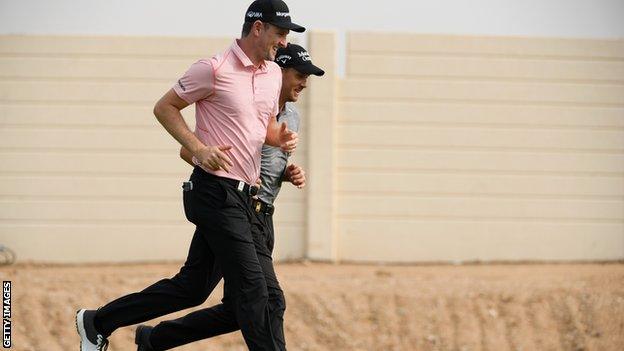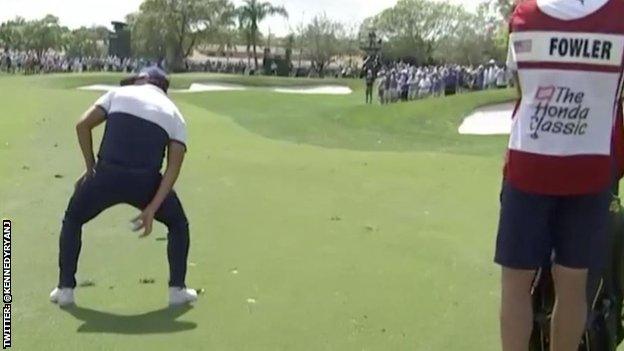Iain Carter: Golf's top pros who break the rules should not blame rule-makers
- Published
- comments

Justin Rose and Henrik Stenson do their bit to speed up play by running from the tee during the recent Saudi International
Many of the world's top golfers are proving more and more outspoken, especially on the hot topic of slow play.
Justin Rose has been addressing the sport's biggest problem, while Brooks Koepka wants to sack the game's rule-makers and Justin Thomas is embroiled in a Twitter spat with the United States Golf Association (USGA).
Rickie Fowler last week fashioned a "toilet drop" to express his displeasure at the way the game is going.
Then add into the mix the recent disqualification of Sergio Garcia for roughing up the greens in Saudi Arabia and Bryson DeChambeau's petulant assault on a bunker and practice green in Mexico.
And there were the snail-paced tactics of an unrepentant JB Holmes while winning the Genesis Open in Los Angeles a couple of weeks ago.
Has there been a more contentious start to a golfing year?
Whatever the rights and wrongs of the way pros are handling the 2019 rule changes, it is slow play that provides the biggest problem.
So it was refreshing to read Rose's view in the latest edition of Golf World. Yes, he tiptoes around the subject a little, but the Olympic champion makes valid observations.
"I think it is getting a little out of hand and you're seeing some guys taking an inordinate amount of time to hit shots and that's not fair," wrote the world number two.
"That needs to be aggressively stamped out."
Most revealing is the way Rose describes how he handles playing with a typically painstaking partner.
"I tend to watch the crowd when certain players get over the ball and see their reaction to how long it takes them to hit a shot," he said.
"It can be quite funny to see the reactions, looks of disbelief and sometimes chuckles in reaction to a guy taking so long."
Except it is no laughing matter. Slow play makes the game dreadfully unpalatable, which is why so many of the recent rule alterations were aimed at making golf quicker.
Dropping from knee height is more efficient because balls will land more softly and fewer re-drops should be required. Banning caddies from standing in a position where they could line up their players also removes scope for extra delays.
Yet these alterations are at the heart of the gripes that have put Thomas and his US Ryder Cup team-mate Fowler at odds with the rule-makers.
Fowler was penalised for dropping from shoulder height after shanking out of bounds in Mexico.
In the following tournament, The Honda Classic in Palm Beach last week, he joked about making a legal drop by squatting and putting his hands behind his legs so that the ball fell from the statutory knee height but from under his rear end.
All very pointed and amusing, but who made the original mistake? Fowler knew the new rules and had a caddie standing next to him in Mexico.
He could have re-dropped without penalty but did not twig his error before hitting his shot. That lack of due diligence was his fault and not the result of a "terrible" rule change.
He claims dropping from knee height does not look cool and will adversely affect efforts to grow the game, but is that genuinely logical?

Rickie Fowler pretended to perform a 'toilet drop' last week after previously criticising the rule changes
Koepka, who in recent weeks has spoken about slow play and Garcia's misconduct, is remaining true to his word with regard to making his feelings known.
The American believes the rules should be made by the professional tours and not officials at the USGA and Royal and Ancient.
"I don't know any other professional sport where the professional organisation running the event doesn't have their own rules," he said.
Never mind that the R and A boasts an enviable record in getting players around Open venues on schedule and both bodies are the historical custodians of the game.
"We have an organisation that runs one event a year, (the USGA, which administers the US Open) and they make the rules for the year," the three-time major winner added.
He believes the leading officials of the PGA and European Tours - Slugger White and John Paramor - should be responsible for how the professional game is played.
"If they got together and made their own rules, it would be fair and a much better experience for players and fans," Koepka asserted.
Undoubtedly there has been a breakdown in trust between the leading American players and the USGA. The set-up of US Open courses invariably provokes criticism and controversy. Thomas claims the USGA are not bettering the game.
"The lack of communication that they have with us, the current players, it just doesn't seem like they're making a very good effort," said the world number four.
This came in the wake of Adam Schenk being retrospectively penalised two strokes because his caddie, Mark Carens, stood directly behind him during last week's Honda Classic.
Again, where does the fault lie? Surely with the player and the caddie, not the new regulation. Where was their diligence on a rule change that has already made headlines and been subject of official clarification?
Thomas's criticisms provoked an extraordinary and, according to the player, "hurtful" response from the USGA on Twitter.

"Justin, we need to talk," the governing body's PR department tweeted.
"You've cancelled every meeting we've planned with you, but we are reaching out again. We were at the first five events and tournaments last year, and your tour has had a seat at the table for seven years. We'd love nothing more than to give you a seat. Call us."
It was not the most diplomatic approach but it shows increasing levels of exasperation felt by the rule makers. They are trying to make the game easier and quicker to play and throughout the process have consulted major tours.
Yet they are being blamed by some of golf's biggest names for mistakes made by players in the heat of competition. Those golfers, as professionals, should have known better.
There is a lot of whining going on at the moment from some of the sport's most influential voices - Rose calling out the slow coaches is the argument that has most merit.